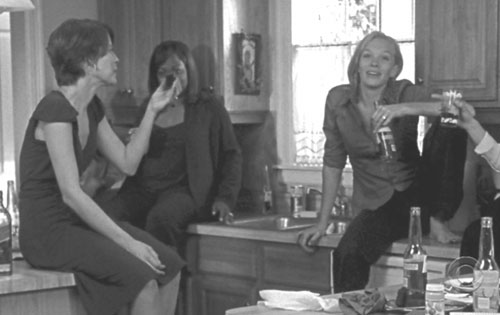 There is only one The Unit
There is only one The Unit

Who doesn’t want to be an army wife, downing a Corona while hanging out on the kitchen counter with her crew as the sun shines brightly outside? Only the worst kind of terrorist, that’s who.
This year we secretly cultivated an interest in a television show, The Unit. This isn’t something to be proud of, especially since it isn’t even the show’s first season, but we’re fessing up. And to be completely honest, there is no “we.” MrLittlePants has resisted The Unit’s charms, leaving only one faithful viewer to project himself into the televised kitchen. Sitting on countertops. Drinking Corona. And if you have a problem with that, you’d better just walk away, because we are totally trained in killing people.
The structure of the show is a familiar one for watchers of Alias (where the screen name Doctor Barnett obviously has its origins, because no one here is a damn doctor nor do we even like doctors, or anyone with advanced degrees for that matter). There is approximately one mission per episode, almost always in some foreign locale generally unknown to Americans. It is not uncommon to see a place name and say to yourself, “There is no way I could find that on a globe. Not even the country.” Before the mission there is sometimes a briefing. Its only purpose is to tell you who the bad guys are, so that you can later be surprised when they turn out to be the good guys—but not always!
Missions are violent and exciting without being entirely unbelievable. They’re engaging and consume the bulk of the screen time but—remarkably—they almost never drive the plot of the series. There is very little that happens in the foreign places with funny names that need be recalled or referenced in future episodes. While this might seem annoying, it isn’t.
The plot of the series is driven instead by the home life, a conceit that is pulled off with aplomb in The Unit. While Sidney Bristow’s “friends” would fall into and out of the Alias story line (like plunky Francie who was a friend, restaurateur, everyone’s fiancee, and evil clone, before settling on being dead), here the home-side cast is reliably present, and they conduct themselves like actual characters with aims beyond the next forty-five minutes.
The wives’ believability helps soften the more ridiculous elements of the show; chase scenes feel as if they might have a narrative purpose when they’re alternated with planning meetings for a bake sale at the base. (That’s what they call it: “the base.” Who knew!) But even by itself the drama among the women is worth watching because, as noted above, these ladies like to kick back on the counter with some beers from time to time—they are no joke.
We like The Unit because it gives us a way to think about the military, our government’s largest and most expensive department, outside the infuriating context of current foolhardy deployments. Its unspectacular home drama is a porthole into army lives, at least as some gay screenwriter imagines them to be. Seeing as we aren’t joining the army, and not just because they officially consider us too immoral to be admitted, The Unit is as close as we’re going to get to understanding it.
The first season is on NetFlix; the second will be later. Catch up and we’ll see you in the fall.

Backtalk
Dear, you are now much closer to understanding this life, even without The Unit. You have me!
Oooh, can I be your Francie? But if I’m going to be killed and replaced with a clone I’d like my death scene to be a little less cliche than hers, if you can arrange for that.
Add a comment